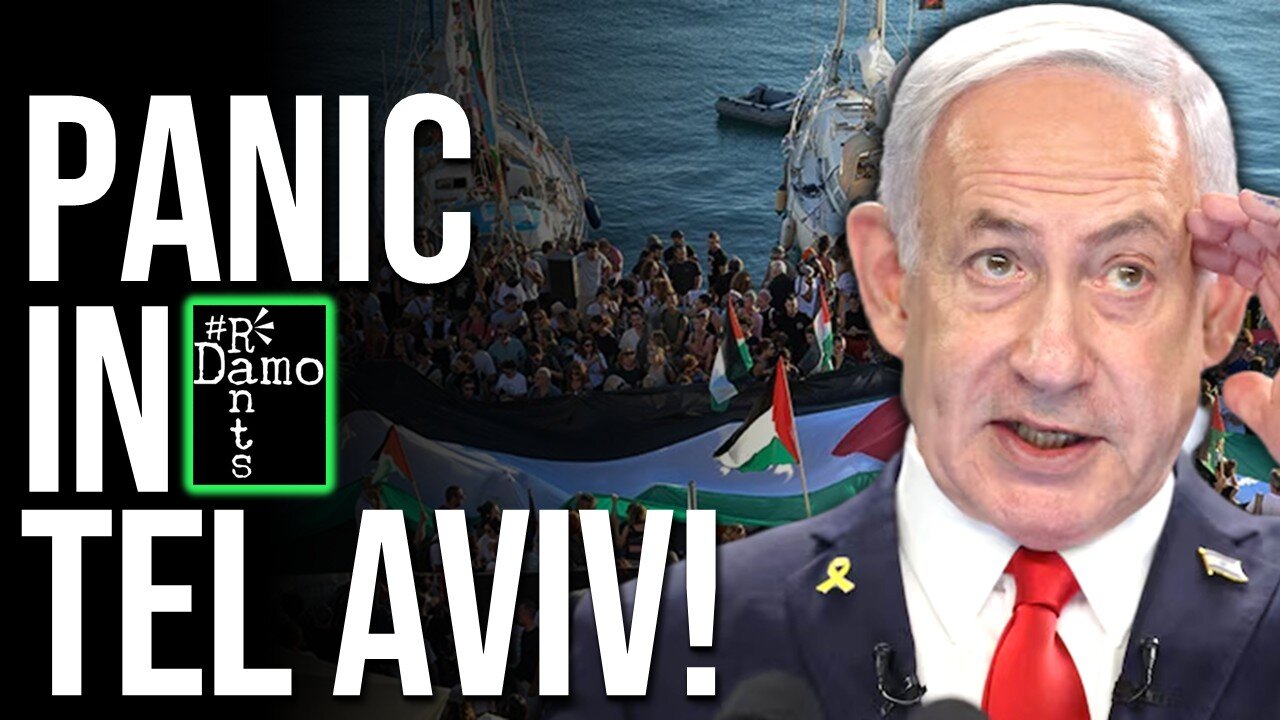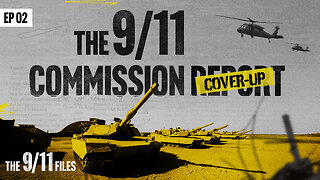Premium Only Content

The Sumud Flotilla Just Got Bodyguards – And Israel is Freaking Out
Right, so here we are again. A handful of boats filled with civilians — students, trade unionists, Greta Thunberg — sailing with baby formula and bandages, and Israel shaking with rage as though they were an armada of destroyers. What terrifies Tel Aviv, just as was the case with every previous flotilla isn’t the cargo; it’s the cameras, the flags, the audacity, the attention. It takes away from their victim status. Every flotilla Israel brands as a terrorist plot, yet this time the supposed “terrorists” are parliamentarians, pensioners, activists with GoPros. But for once, the usual silence has cracked here, because where the world has watched previous boats seeking to break the siege of Gaza make their way across the Med in silence, even after said boats get captured in international war by Israel in what are acts of piracy. This time Sixteen nations, from Spain to South Africa, Brazil to Bangladesh, have effectively declared themselves the Flotilla’s bodyguards. Not frigates or fighter jets, but something harder for Israel to dismiss: political cover. If Israel attacks, it won’t just be Gaza under fire but the sovereignty of half the globe, many of whom have their own citizens aboard these boats. But the question that remains when it comes to the crunch, is will these bodyguards hold the line?
Right, so picture the scene. Dozens of ships strung out across the Mediterranean, patched together from Tunisian harbours, Spanish ports, and soon to be joined by more from Italy and the Greek islands. This is of course not a naval convoy, not a show of force by an empire, but a fleet of civilians. Students, trade unionists, parliamentarians, cultural figures. They carry aid, yes — food, medicine, essentials — but what they carry above all is defiance, because once more boats are sailing across the Med to break the siege of Gaza. This is the Global Sumud Flotilla, the largest civilian attempt ever launched to break Israel’s siege on Gaza. And for the first time in the history of these maritime missions, they are not alone.
Because while Israel has long treated these flotillas as open season — boarding, seizing, even killing without serious consequence, as was the case of the Mavi Marmara — this time the world has shifted and not before time. Sixteen sovereign states, from every corner of the globe, have issued a joint warning in relation to the Flotilla aimed squarely at Israel. Spain, Ireland, Slovenia. Brazil, Colombia, Mexico. Turkey, Qatar, Oman. South Africa, Indonesia, Malaysia, Pakistan, Bangladesh, the Maldives, Libya. Together they have declared in advance that the flotilla is civilian, that its mission is humanitarian, and that any unlawful act against it will not pass in silence but will “lead to accountability.” For the first time, Israel faces not just activists at sea but a chorus of nations standing between it and its intended victims sailing their way. These states have made themselves political bodyguards. And the question is, will they act like bodyguards if, or rather when Israel inevitably attacks them as they have every other ship headed their way with aid?
As I’ve mentioned in several Flotilla videos now, the protection that has been missing before is highly relevant as much as the bodyguards present this time do as well. In 2010, the Mavi Marmara set out for Gaza as part of the Freedom Flotilla Coalition. It was boarded in international waters by Israeli commandos, and nine people were killed on deck. Israel spun the story as one of soldiers “lynched” by violent activists, a lie that collapsed only when footage emerged of live fire against unarmed passengers. Turkey was left to rage alone, expelling the Israeli ambassador, suspending military ties, and pleading for accountability at the United Nations. Other states issued statements but no one else truly stood up. So the lesson from that event was brutal: without a coalition, Israel’s impunity would hold. And it did, through flotilla after flotilla. Boats were seized quietly in 2018, 2020, 2023, this year as well. Activists were detained and deported. But each time the world moved on.
So why now, has the script shifted? Partly because the ground beneath Israel has changed. The International Court of Justice has already ruled that there is a plausible case of genocide in Gaza. The UN has ruled now that there is genocide in Gaza. The images of destroyed cities, of skeletal children dying from starvation, of deliberate aid obstruction, have burned into global consciousness. Israel’s propaganda line — that every civilian boat is a front for “terrorists” — no longer holds water. When the world sees Greta Thunberg boarding, when politicians announce their participation, when trade unionists livestream their journey, the absurdity of branding them as Hamas operatives collapses. The flotilla has learned: transparency is its greatest shield. Why else do they film and document everything, journalists – proper ones - on board these vessels as well of course.
And people everywhere have taken up the cause. In Tunis, thousands rallied in Sidi Bou Said after drone strikes hit flotilla vessels in their port, denouncing what they saw as Israeli attempts at intimidation, because who else would it be? In Genoa, tens of thousands marched in solidarity, one of the largest pro-flotilla protests in Italy’s history. In Barcelona, crowds thronged the waterfront as the ships departed, turning a port into a stage of defiance. Paris saw rallies with paper boats held high. Even Naples and Mallorca joined in, demonstrations rippling out across the Mediterranean. These are not isolated gestures. They are the rear guard, ordinary people forcing governments to take notice, insisting that this time there must be protection.
And protection, astonishingly, has come. Sixteen nations have put their names to a document declaring the flotilla legitimate, civilian, lawful. It is worth pausing on the breadth of this. Spain, Ireland, and Slovenia are EU members, breaking the usual consensus of silence. Brazil, Colombia, and Mexico are Latin American heavyweights, with Brazil and Colombia already straining ties with Tel Aviv. Turkey has long been a critic but this time it is joined by Qatar and Oman from the Gulf, both typically neutral mediator states, though in Qatar’s case that has been blown sky high by an Israeli attack on Doha. Even fractured Libya has signed up to this. South Africa is already prosecuting Israel at the ICJ for genocide. Indonesia, Malaysia, Pakistan, Bangladesh, and the Maldives add the weight of populous Muslim-majority states. This is not one bloc. It is a patchwork shield across continents. It is a group of nations not immediately tied together necessarily, finding common cause around this fleet.
So what does it mean for Israel to face this? This time it has to be different right? At the very least, it removes their plausible deniability. No one can claim, as they have done before, that Israel acted against “pirates” or “unknown militants.” The flotilla has been vouched for by sovereign states. Nationals of those states are on board. An attack on the flotilla is therefore an attack not just on civilians but on the citizens of Spain, Ireland, Brazil, South Africa, Indonesia, and others whose governments have already said they will hold Israel accountable. So the calculus has altered this time.
Now here is the grotesque absurdity at the heart of this. Israel’s go-to excuse has always been the same: every flotilla, no matter how transparent, is smeared as a “terrorist front.” Every sack of flour is a “potential weapon.” Every student activist is a “smuggler.” That lie worked in the shadows of 2010 and the intervening years since, perhaps, to increasingly lesser extents. It worked when cameras were scarce and the narrative could be shaped after the raid. But today, with well known figures boarding openly, with parliamentarians declaring their passage, with trade union banners flying from the decks, cameras everywhere, that propaganda won’t wash this time. Are we really supposed to believe Greta Thunberg is Hamas? That MPs are hiding rockets in food bags? That students are smuggling missiles? This is the grotesque overreach of Israel’s excuse machine, and it is why the flotilla is so dangerous to its narrative. It unmasks the blockade for what it is: not security, but collective punishment and genocide.
The scenarios ahead for the Flotilla nevertheless are still no laughing matter, its why this support, this guardianship from 16 nations is so important. If Israel merely harasses the flotilla — shadowing it with gunboats, issuing radio threats, perhaps firing water cannons — we can expect diplomatic protests, debates in Brussels, resolutions at the Organisation of Islamic Cooperation, motions at CELAC in Latin America. Spain and Ireland will push for language in the European Union reminding Israel of its liability. Brazil and Colombia will use regional bodies to raise the alarm. South Africa will add the harassment to its genocide case filings. It will be loud, but limited. You might think this a tame response given how Israel has reacted already, but they’ve never dealt with this many boats before either so I figure its worth consideration that they might back down in their response, though not give in to it.
If Israel goes further and boards the ships without casualties, as they have done before, detaining activists and diverting vessels to Ashdod, the temperature rises. Ambassadors could be recalled. Turkey may expel the Israeli envoy again, as it did after the Mavi Marmara. South Africa could seek emergency hearings at the ICJ. Brazil and Colombia could push sanctions. The European Union may demand the suspension of the EU-Israel Association Agreement, partially done at this point, but could go a lot further. This many boats, just ignoring this, just won’t be accepted this time. This would sting Israel diplomatically in ways it has not faced for years. The question of if they could board this many boats without a few getting through though is something else entirely.
And if Israel were to use lethal force because they couldn’t contain the flotilla — if blood is spilled on decks again — then these bodyguards will face their ultimate test. South Africa would file new charges at the ICJ. Spain and Ireland would be under immense pressure to push the EU for sanctions having taken leads in Europe on this as they have. We can speculate until the cows come home ultimately, but in other words, a diplomatic earthquake, nothing less would do.
But as much as I might call this speculation, these are moves grounded in precedent. Turkey expelled Israel’s ambassador after 2010. South Africa has already hauled Israel before the ICJ. Colombia has already broken ties under President Gustavo Petro. Spain has recognised Palestine and pushed sanctions debates in the EU. These governments are not making idle threats. They have already acted in recent years and may well do so again should Israel attack this Flotilla which they have now placed under their wings.
There is a bitter irony in all this that cuts deep though and these bodyguard nations need to accept that this on them too. Why should a civilian aid flotilla need bodyguards at all? Why should this require a civilian aid flotilla full stop? Why doesn’t Spain just send ships in, or Italy, or France or whoever frankly? International law is explicit: freedom of navigation in international waters is sacrosanct. Attacking unarmed civilian ships is piracy. And yet, when Israel does it, the so-called rules-based order shrugs. National vessels wouldn’t get treated this way and were past time that this needed doing. No one asked for bodyguards when international activists sailed to East Timor or South Africa under apartheid. But Palestinians must be protected from the very state that claims to be a democracy, a state that has turned the Mediterranean into a killing ground for those who dare bring baby milk instead of bullets.
Would any other state in the world be allowed to drone civilian vessels in foreign harbours, as Israel stands accused of doing in Tunisia? Would Russia be allowed to machine-gun activists on boats in the Black Sea and still be welcomed in Brussels? Would Iran be tolerated if it stormed a fleet of Western parliamentarians bringing aid to besieged civilians? Yet Israel has done all this before and faced nothing but empty words. The flotilla and its bodyguards have exposed this double standard now for all to see, or have if you’ve heard about any of this, because guess where you won’t find stories like this? Western mainstream media.
What is at stake here is more than Gaza, though Gaza is the beating heart of it. It is the question of whether international law has any force left in real time. The ICJ has ruled on genocide in Gaza, so has the UN now, but Israel continues its war. The ICC has opened investigations, but mooted warrants against the likes of Smotrich and Ben Gvir appear to be gathering dust. The flotilla puts the question differently: can law protect lives at sea, not just produce judgments years later? Can a coalition of states act as bodyguards in practice, not just on paper? If not, then what remains of the so-called international community at all?
For those states, there are risks too. Spain, Ireland, and Slovenia risk isolation within the EU, where Germany and France and the UK still cling to Israel’s side. Brazil and Colombia risk pressure from Washington, Colombia already facing such for very different reasons. South Africa already faces Western economic pressure for its ICJ case. But the calculus continues to shift against that: to remain silent now is worse. As activists in the Maghreb section of the Flotilla have declared, “silent regimes have failed us.” The same message applies globally: silence is complicity, and complicity is toxic.
So where does that leave us? With a test. A test of Israel’s arrogance, yes, but also a test of the bodyguards’ resolve. Will they step forward if the flotilla is attacked, when as seems more likely the case, or will they melt away and their signatures on a letter mean nothing? Will international law be defended in real time, or only after days, weeks, months of imprisonment in filthy Israeli prisons, or God forbid after the funerals? Will this be remembered as the moment Israel’s impunity over its siege of Gaza began to crack, or as another betrayal of civilians who dared to defy that siege?
Already, the flotilla has achieved something remarkable and I’m not talking about the scale of the Flotilla this time, the largest there has ever been. It has forced the world to choose. Between solidarity and silence. Between complicity and accountability. Between allowing Israel to attack civilians yet again, or finally drawing the line. It is no longer just a flotilla. It is a line in the sand.
And so the world watches. The ships sail on. The protests roar on land. The sixteen nations hold their signatures aloft like a shield right now. The sea waits, and with it, the verdict.
Sixteen nations have vowed accountability. But what will they actually do when the first Israeli gunboat appears on the horizon?
Of course for as much as the Flotilla aims to break the siege, the main focus right now is very much on Gaza City, a ground invasion having now begun, escalation once more and the world still sits and watches and does nothing, which is of course not reassuring for thew Flotilla’s fate, but its also not entirely going Netanyahu’s way either so get all the details of that story in this video recommendation here as your suggested next watch.
Please do also hit like, share and subscribe if you haven’t done so already so as to ensure you don’t miss out on all new daily content as well as spreading the word and helping to support the channel at the same time which is very much appreciated, holding power to account for ordinary working class people and I will hopefully catch you on the next vid. Cheers folks.
-
 LIVE
LIVE
Barry Cunningham
9 hours agoBREAKING NEWS: PRESIDENT TRUMP AND PETE HEGSETH MAKE HUGE ANNOUNCEMENTS!
4,880 watching -
 25:11
25:11
Tucker Carlson
19 hours agoThe 9/11 Files: The Cover-up Commission | Ep 2
64.9K29 -
 LIVE
LIVE
LFA TV
10 hours agoBREAKING NEWS ALL DAY! | TUESDAY 9/30/25
1,252 watching -
 1:09:10
1:09:10
Game On!
20 hours ago $1.28 earnedFINALLY! MLB Postseason IS HERE!
34.6K2 -
 10:29
10:29
Ken LaCorte: Elephants in Rooms
18 hours ago $2.59 earnedWhy Did Britain Protect Child Molesters?
37.8K19 -
 8:19
8:19
Adam Does Movies
1 day ago $1.06 earnedOne Battle After Another - Movie Review
13.1K2 -
 39:24
39:24
NAG Daily
15 hours agoThe Rezendes Rundown Ep. 21 - National Distress
12K1 -
 2:01:19
2:01:19
BEK TV
1 day agoTrent Loos in the Morning - 9/30/2025
11.2K3 -
 LIVE
LIVE
The Bubba Army
23 hours agoTrump & Netanyahu Done Deal? - Bubba the Love Sponge® Show | 9/30/25
1,622 watching -
 9:15
9:15
ThinkStory
1 day ago6 INSANE Cipher Theories!
22.5K1